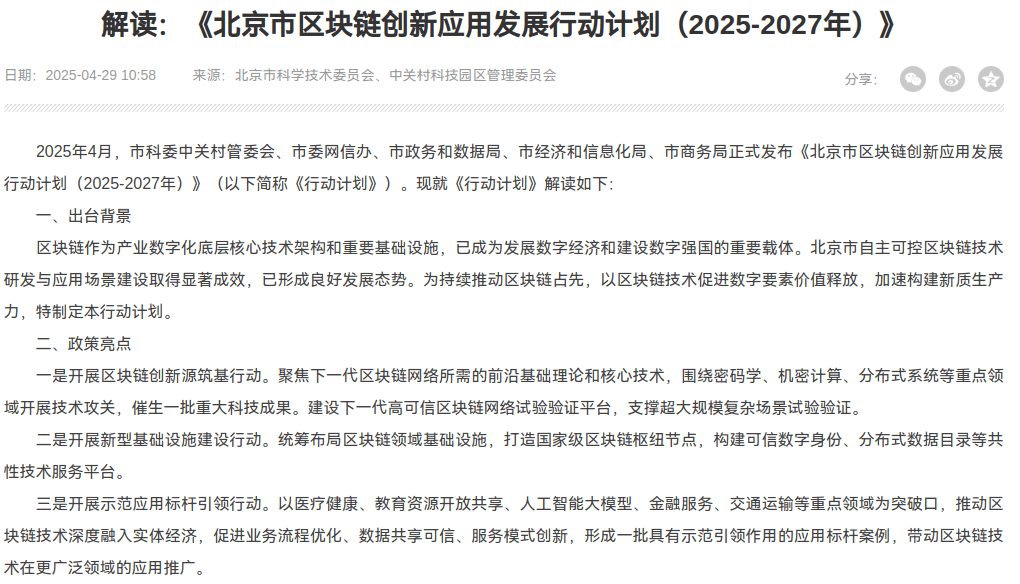The Beijing city administration has unveiled a comprehensive plan to develop and implement blockchain technology across various sectors over the next two years. This initiative aims to position Beijing as a leading hub for blockchain innovation and application.
According to an official announcement made on April 29, the “Beijing Blockchain Innovation and Application Development Action Plan” was jointly formulated by several key municipal bodies, including the Beijing Municipal Science and Technology Commission. The plan spans from 2025 to 2027, marking a significant commitment to blockchain technology.

The plan recognizes blockchain as a foundational technology crucial for industrial digitalization and digital infrastructure. A key objective involves enhancing the value extraction from digital assets through blockchain technology. The city claims to have already made significant strides in autonomous blockchain technology development.
Key Pillars of Beijing’s Blockchain Plan
Beijing’s blockchain initiative is built upon several key pillars designed to foster innovation, drive industry adoption, and establish a robust blockchain ecosystem. These include:
- Blockchain Software Development: Focus on breakthroughs in cryptography, confidential computing, and distributed systems.
- Infrastructure Development: Building national blockchain hub nodes and platforms for trusted digital identity and distributed data directories.
- Industry Integration: Applying blockchain to healthcare, education, AI, financial services, and transportation.
Specific Goals and Objectives
The “one blockchain, one network, one platform” principle guides the project. By 2027, the project aims to achieve several ambitious goals:
- Implement dedicated blockchain chips and privacy protection features.
- Enable crosschain interoperability and distributed networking.
- Achieve petabyte-scale trusted node storage.
- Facilitate large-scale blockchain interoperability.
- Develop a hundred-million-user-scale interoperable trusted identity system.
- Establish at least 20 practical blockchain use cases.
Target Industries and Applications
Beijing’s blockchain initiative targets a diverse range of industries, seeking to leverage the technology’s capabilities to enhance efficiency, security, and transparency. Some of the key target industries include:
- Healthcare: Improving data security and interoperability for patient records, supply chain management for pharmaceuticals, and clinical trial management.
- Education: Creating tamper-proof records for academic credentials, facilitating secure data sharing between institutions, and developing innovative e-learning platforms.
- Artificial Intelligence (AI): Enhancing data integrity and traceability for AI model development, securing AI-driven applications, and enabling decentralized AI marketplaces.
- Financial Services: Streamlining payment processes, improving fraud detection, enhancing KYC/AML compliance, and facilitating the development of decentralized finance (DeFi) applications.
- Transportation: Optimizing logistics and supply chain management, enhancing vehicle tracking and security, and facilitating smart transportation systems.
Potential Implications and Impact
Beijing’s investment in blockchain technology has the potential to significantly impact various aspects of the city’s economy and society. Some of the potential implications include:
- Economic Growth: Driving innovation and creating new business opportunities in the blockchain sector, attracting investment, and boosting economic growth.
- Enhanced Efficiency and Transparency: Streamlining processes, reducing costs, improving data accuracy, and fostering greater transparency in various industries.
- Improved Security and Trust: Enhancing data security, preventing fraud, and building trust in digital transactions and interactions.
- Greater Innovation and Competitiveness: Fostering a culture of innovation, attracting talent, and positioning Beijing as a global leader in blockchain technology.
Comparison to Previous Web3 Initiatives
This announcement builds upon Beijing’s previous efforts to promote Web3 innovation. In May 2023, the city released a white paper recognizing Web3 as a key trend for future internet development. The commission hoped to establish Beijing as a digital economy innovation hub, allocating at least 100 million yuan annually. This latest blockchain initiative demonstrates a continued commitment to fostering cutting-edge technologies.
Conclusion
Beijing’s ambitious blockchain plan signals a major step toward integrating blockchain technology into the city’s infrastructure and economy. By focusing on key areas like software development, infrastructure building, and industry applications, Beijing aims to become a global leader in the blockchain space. The success of this initiative could serve as a model for other cities and regions looking to leverage the transformative potential of blockchain technology.